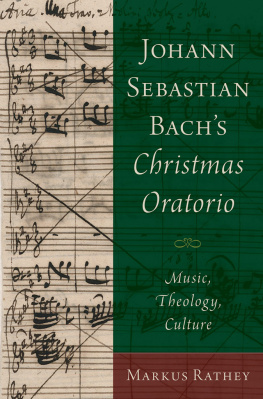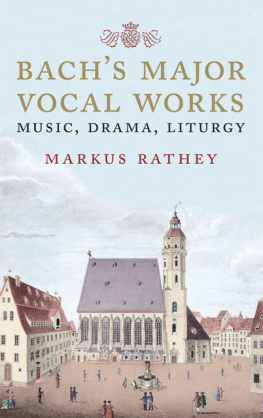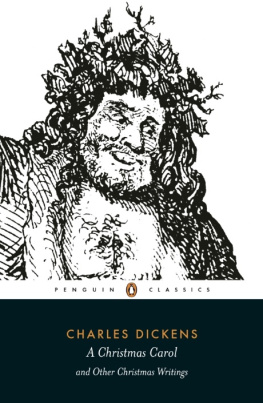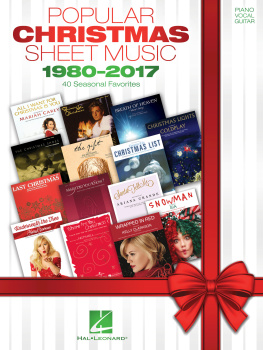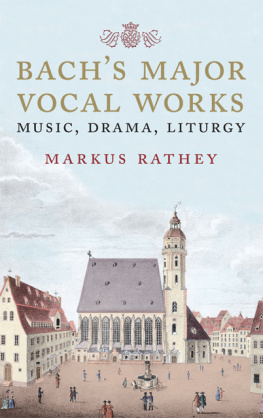Johann Sebastian Bachs
Christmas Oratorio

Oxford University Press is a department of the University of Oxford. It furthers the Universitys objective of excellence in research, scholarship, and education by publishing worldwide. Oxford is a registered trade mark of Oxford University
Press in the UK and certain other countries.
Published in the United States of America by Oxford University Press
198 Madison Avenue, New York, NY 10016, United States of America.
Oxford University Press 2016
All rights reserved. No part of this publication may be reproduced, stored in a retrieval system, or transmitted, in any form or by any means, without the prior permission in writing of Oxford University Press, or as expressly permitted by law, by license, or under terms agreed with the appropriate reproduction rights organization. Inquiries concerning reproduction outside the scope of the above should be sent to the Rights Department, Oxford University Press, at the address above.
You must not circulate this work in any other form and you must impose this same condition on any acquirer.
Library of Congress Cataloging-in-Publication Data
Names: Rathey, Markus.
Title: Johann Sebastian Bachs Christmas Oratorio : music, theology, culture/Markus Rathey.
Description: New York : Oxford University Press, [2016] | Includes
bibliographical references and index.
Identifiers: LCCN 2015049008 (print) | LCCN 2015049271 (ebook) | eISBN 9780190624033
ISBN 9780190275259 (hardcover : alk. paper) | ISBN 9780190275266 (e-book)
Subjects: LCSH: Bach, Johann Sebastian, 16851750. Weihnachts-Oratorium.
Classification: LCC ML410.B13 R287 2016 (print) | LCC ML410.B13 (ebook) | DDC
782.23dc23
LC record available at http://lccn.loc.gov/2015049008
This volume is published with the generous support of the Lloyd Hibberd Endowment of the American Musicological Society, funded in part by the National Endowment for the Humanities and the Andrew W. Mellon Foundation
Tell me where is fancy bred/Or in the heart, or in the head?
William Shakespeare, The Merchant of Venice, III, 2
Perch s' ver, che nel tuo cor io sia,
Entro al tuo sen celata,
Non posso da' tuoi lumi esser mirata.
Claudio Monteverdi, L'incoronazione di Poppea, I, 3
God's love and grace are not just mathematical or mechanical relations,
but have their true seat and origin in the movement of the heart of God.
Karl Barth, Church Dogmatics II, 1, 370
CONTENTS
My first words of thanks go to my graduate students who have, in several seminars, discussed Bach and his vocal music, the interpretation of Bach sources, the history of the oratorio in the seventeenth and eighteenth centuries, and the religious and devotional landscape in Germany in the eighteenth century. I have learned a lot from the keen eyes of music theorists, conductors, singers, music historians, and theologians. The unique mixture of talents and interests at Yale has left its mark on the multifaceted approach to Bachs Christmas Oratorio and is reflected in this book.
I would also like to thank my colleagues at Yale, the School of Music, the Department of Music, the Divinity School, and in particular my colleagues and friends at the Institute of Sacred Music for their encouragement and the valuable advice. It has been inspiring for me as a scholar to prepare performances of Bachs works with my colleagues Marguerite Brooks, Simon Carrington, David Hill, and Masaaki Suzuki. Having one of my favorite Bach-tenors, James Taylor, as a friend and colleague also provided inspiration. His warm voice on the Rilling recording of the oratorio from 2000 accompanied me through the process of writing this book. My colleague Ellen Rosands book on Monteverdis Venetian Trilogy (2007) encouraged me to bridge the gulf between philology and semantics, between details of the compositional process and the religious and dramatic function of the music.
A large number of friends and colleagues were kind enough to read all or parts of the manuscript at various stages of its development: Danielle Annett, Eric Chafe, Ellen Exner, Bruce Gordon, and Robin Leaver. My thanks go especially to Michael Marissen, who meticulously read the final draft and made numerous suggestions that improved both the style as well as the content of the book. Other colleagues who have lent me their ears and their advice during the genesis of the book were Stephen Crist, Don Franklin, Andreas Glckner, Michael Maul, Daniel Melamed, Mark Peters, and Thomas Troeger.
Some of my current and former students have aided me in my research: Kathryn Aaron, Blenda Bo Kyung Im, Katharine Arnold Luce; my research assistant, Emily Coakley, meticulously edited the manuscript.
I am grateful to a large number of libraries and archives that provided me access to their holdings and which have patiently responded to my requests for copies, scans, and bibliographic information: the Deutsche Staatsbibliothek Berlin (esp. the Musikabteilung), the Bach Archive Leipzig, the Riemenschneider Bach Institute at Baldwin-Wallace University, the Bibliotheca Albertina Leipzig, the Herzog August Bibliothek Wolfenbttel, the Universitts- und Forschungsbibliothek Erfurt/Gotha, the Schsische Landesbibliothek Dresden, and especially the libraries at Yale: the Beinecke Library, the Music Library, and the library of the Divinity School.
The research for this book would not have been possible without the financial support of several institutions. First and foremost I have to thank again the Yale Institute of Sacred Music for institutional and financial support, and for granting me a sabbatical in 2012, which allowed me to examine Bachs composition score for the Christmas Oratorio and other Bach sources in the Deutsche Staatsbibliothek Berlin. The research in Berlin was also supported through a Scheide Research Grant by the American Bach Society. The Martha Goldsworthy Fellowship by the Riemenschneider Bach Institute allowed me to spend several weeks in Berea, Ohio, and to take advantage of the holdings of the institute. I am grateful to the former director Mel Unger as well as the librarian Sandra Eichenberg.
Suzanne Ryan, Daniel Gibney, and Andrew Maillet at Oxford University Press have supported me in this project and have overseen a smooth and efficient production process. I am grateful for their encouragement and their patience during the final stages of the completion of the book. Mary Sutherland copyedited the manuscript, using her editorial skill to improve it in ways too numerous to count.
This book is dedicated to the memory of my late father, Karl-Heinz Rathey (193485) and to my mother, who has supported me on every step of my academic career.
Markus Rathey
New Haven, November 2015
The translations of the texts for Bachs oratorios are based on
The capitalization of pitches and keys uses italics for individual pitches (cde) and roman type for key areas and chords (CDE). Chords (both major and minor) are capitalized whereas pitches appear in lower-case letters (with indication of octaves, like in c); only pitches in the lower octave (CDB) are capitalized.
Names of biblical books are spelled out in full (Matthew 1:23) when cited in running text; cited in parentheses are the abbreviated forms (Mt 1:23):

